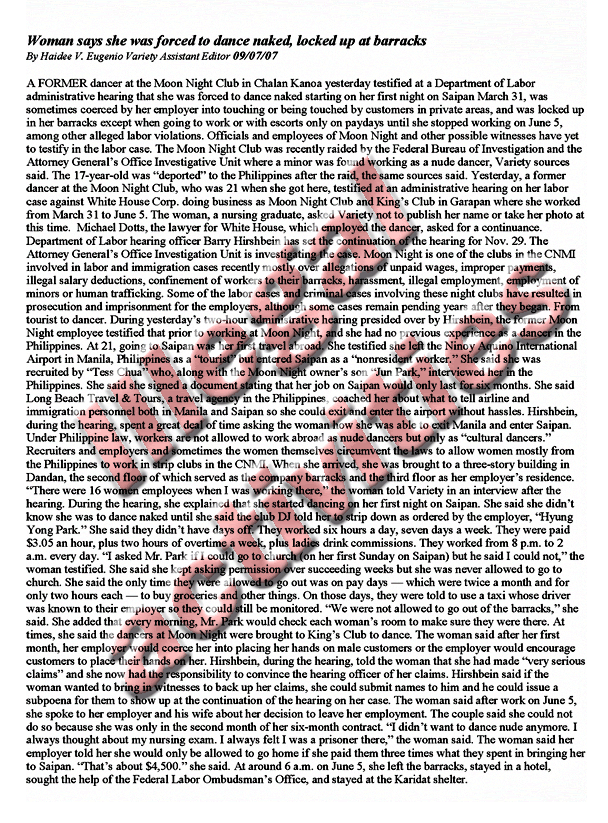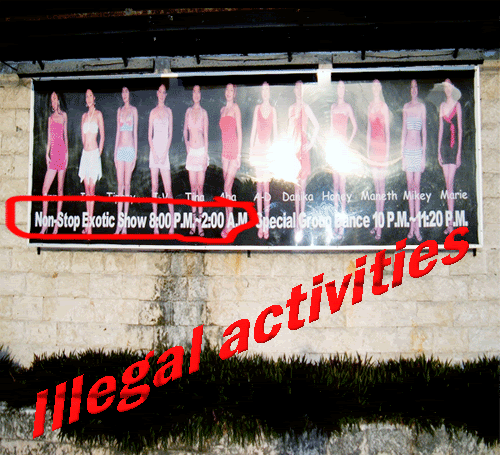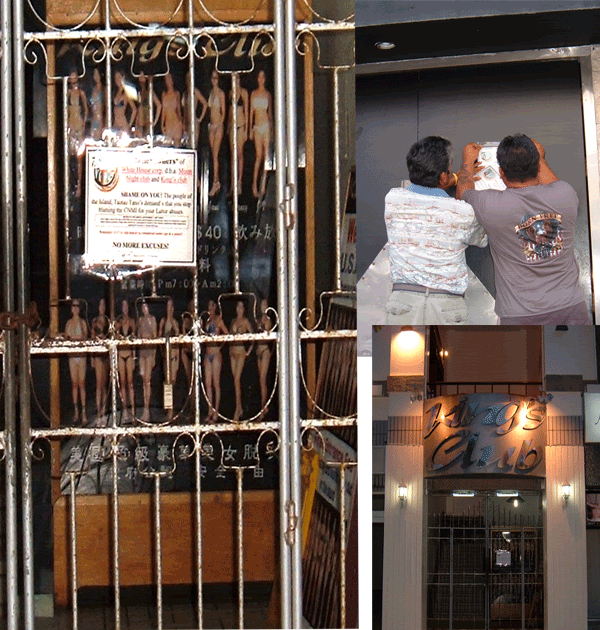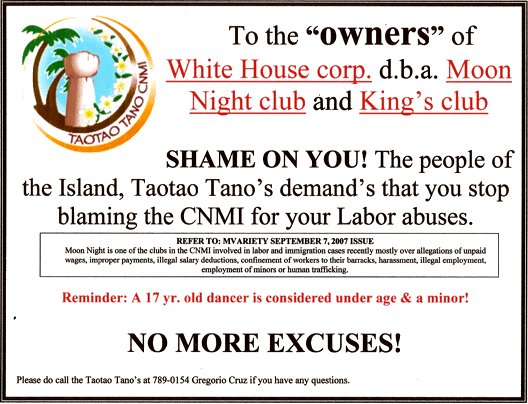Signing of HB 15-38 into law - PL 15-108
Links
While law In Process
Guest Workers
Dekada Movement counsel Stephen Woodruff
BENEDETTO
TINA SABLAN & Propts movement
Indigenous Community Opinion
TAOTAO TANO OPINION
TAOTAO TANO Follow up
- Next meeting: 040208
- 032108 Taotao Tano attends secret meeting on CNMI Residency
Sunday, November 18, 2007
'New labor law includes best practices from US experience'
st-Sunday November 18, 2007
Local
Saturday, November 17, 2007
Last of a four-part series
Editor's Note: The following is a press release issued by the Office of the Governor. It is being published as a series due to its length. Previous sections of this release were published on Nov. 14, 15, and 16, 2007. Visit the Archives section of www.saipantribune.com to see the previous sections.
Lifting of the restrictions on hiring in certain job classifications: In the past, certain job classifications were either reserved entirely for citizens and permanent residents or reserved on a one-to-one (citizen to foreign worker) employment basis. This created inflexibility that hampered some businesses in responding quickly to opportunities in the marketplace. These restrictions have been removed in the new law and replaced with more flexible incentives and weighted advertising requirements designed to achieve the same objectives.
Phase-out of the moratorium: Chapter 3 of the new law phases out the moratorium that was imposed in 1999 when foreign workers were coming to the Commonwealth in very substantial numbers every year. Circumstances have changed. There is a pool of qualified foreign workers in the Commonwealth, so new arrivals are at a relatively low level. The moratorium imposed artificial restraints on business hiring that are no longer necessary. The need for Commonwealth businesses to remain competitive in the Asian market requires that unnecessary controls be removed.
The moratorium will be phased out over a three-year period. In the first year, the visitor industry will not be subject to the moratorium. In the second year, the moratorium will no longer apply to the services industry; in the third year the moratorium will no longer apply to agriculture, fishing and related occupations; and the moratorium will expire entirely by Jan. 1, 2011.
In place of the moratorium, the Commonwealth uses a preference for on-island workers. These workers have first opportunity to take available jobs that cannot be filled by citizens and permanent residents.
Affordable health insurance for foreign workers. The new labor law requires that employers provide medical insurance coverage for their workers, and gives employers three options for providing this coverage. This is a departure from current law which makes employers responsible for medical costs incurred by their foreign workers, but not necessarily by way of insurance coverage. Large employers can self-insure as they now do; some employers can use their own existing insurance coverage as some now do; but a low-cost pool is provided for everyone else. The pool option provides full coverage for a low monthly payment to CHC . This is a very creative solution which will have two significantly positive results: It will make affordable insurance available to employers of foreign workers; and it will provide critically needed funding to CHC. This will allow protection for the employers of domestic workers for whom commercially-available health insurance is often too expensive. The new law provides a transition period, during which existing legal requirements for medical care for foreign workers remain in effect, while new regulations are worked out by the Secretary of Public Health with extensive input from the business community.
Defined time for filing of worker complaints: Under the new law, complaints by foreign workers must be filed within six months of discovering the alleged wrong and in any event within 30 days of the end of the contract period. This will prevent complaints from being brought long after employment has ceased when records and human resources personnel may no longer be available for the employer's defense. Service of process by the Department may be accomplished by publication which will help prevent the accumulation of case backlogs.
Streamlined handling of the periodic exit: The regulations under the new law will provide a procedure under which a period of 60 days absence from the Commonwealth may be substituted for the six-month period required by law for qualifying employers and qualifying foreign workers.
* * *
This legislation was the result of more than a year's deliberation by the Commonwealth Legislature, CNMI employers, and representatives of foreign workers. It was the subject of public hearings and many consultations with business and foreign worker interests. None of the affected parties agrees with all of the legislation's provisions. But the CNMI Legislature - by unanimous vote on three separate occasions - concluded that the legislation constituted a fair balance of the competing interests and would greatly benefit the Commonwealth's economy, its citizens and permanent residents, and its foreign workers.
Local
Saturday, November 17, 2007
Last of a four-part series
Editor's Note: The following is a press release issued by the Office of the Governor. It is being published as a series due to its length. Previous sections of this release were published on Nov. 14, 15, and 16, 2007. Visit the Archives section of www.saipantribune.com to see the previous sections.
Lifting of the restrictions on hiring in certain job classifications: In the past, certain job classifications were either reserved entirely for citizens and permanent residents or reserved on a one-to-one (citizen to foreign worker) employment basis. This created inflexibility that hampered some businesses in responding quickly to opportunities in the marketplace. These restrictions have been removed in the new law and replaced with more flexible incentives and weighted advertising requirements designed to achieve the same objectives.
Phase-out of the moratorium: Chapter 3 of the new law phases out the moratorium that was imposed in 1999 when foreign workers were coming to the Commonwealth in very substantial numbers every year. Circumstances have changed. There is a pool of qualified foreign workers in the Commonwealth, so new arrivals are at a relatively low level. The moratorium imposed artificial restraints on business hiring that are no longer necessary. The need for Commonwealth businesses to remain competitive in the Asian market requires that unnecessary controls be removed.
The moratorium will be phased out over a three-year period. In the first year, the visitor industry will not be subject to the moratorium. In the second year, the moratorium will no longer apply to the services industry; in the third year the moratorium will no longer apply to agriculture, fishing and related occupations; and the moratorium will expire entirely by Jan. 1, 2011.
In place of the moratorium, the Commonwealth uses a preference for on-island workers. These workers have first opportunity to take available jobs that cannot be filled by citizens and permanent residents.
Affordable health insurance for foreign workers. The new labor law requires that employers provide medical insurance coverage for their workers, and gives employers three options for providing this coverage. This is a departure from current law which makes employers responsible for medical costs incurred by their foreign workers, but not necessarily by way of insurance coverage. Large employers can self-insure as they now do; some employers can use their own existing insurance coverage as some now do; but a low-cost pool is provided for everyone else. The pool option provides full coverage for a low monthly payment to CHC . This is a very creative solution which will have two significantly positive results: It will make affordable insurance available to employers of foreign workers; and it will provide critically needed funding to CHC. This will allow protection for the employers of domestic workers for whom commercially-available health insurance is often too expensive. The new law provides a transition period, during which existing legal requirements for medical care for foreign workers remain in effect, while new regulations are worked out by the Secretary of Public Health with extensive input from the business community.
Defined time for filing of worker complaints: Under the new law, complaints by foreign workers must be filed within six months of discovering the alleged wrong and in any event within 30 days of the end of the contract period. This will prevent complaints from being brought long after employment has ceased when records and human resources personnel may no longer be available for the employer's defense. Service of process by the Department may be accomplished by publication which will help prevent the accumulation of case backlogs.
Streamlined handling of the periodic exit: The regulations under the new law will provide a procedure under which a period of 60 days absence from the Commonwealth may be substituted for the six-month period required by law for qualifying employers and qualifying foreign workers.
* * *
This legislation was the result of more than a year's deliberation by the Commonwealth Legislature, CNMI employers, and representatives of foreign workers. It was the subject of public hearings and many consultations with business and foreign worker interests. None of the affected parties agrees with all of the legislation's provisions. But the CNMI Legislature - by unanimous vote on three separate occasions - concluded that the legislation constituted a fair balance of the competing interests and would greatly benefit the Commonwealth's economy, its citizens and permanent residents, and its foreign workers.
Variations: Déjà vu all over again
mv-Monday November 19, 2007
By Zaldy Dandan
Variety Editor
AT least two lawyers familiar with CNMI labor issues have come out with a detailed critique of the latest labor “reform” law which Capital Hill enacts every time the feds threaten to end the governor’s control over local immigration. The administration’s rebuttal can be summed up in two words: “They’re wrong.” Why? Because.
The administration likes to point out that this measure has been reviewed many times. Now what does that mean? A lot of scientists can repeatedly analyze a mound of cow crap — but will that turn it into gold? The administration also considers the unanimous passage of the bill as one of its merits. And yes we are talking about the same Legislature whose other legislative masterpieces the governor had to veto. Lawmakers, as we all know, will pass anything that will keep them in office. This labor “reform” law was packaged as a “pro-local workers” measure that will also end the “abuse” of the system perpetrated by “abusive guest workers.” How do you vote “no” to that?
But as one of the law’s critics noted, the proponents of this law say one thing while their handiwork says something else.
Here’s my own question to the ordinary citizens who would like to give this law the benefit of their doubt: Do the administration and Legislature have any credibility in drafting and enforcing labor and immigration laws that actually do what they’re supposed to do? Here’s another question. Whatever happened to the previous stay-limit laws and other reform measures they enacted in the past?
Precedent and the track record of the CNMI government doom this new law.
Its enactment is partly premised on the hope that U.S. lawmakers are afflicted with amnesia and will, once again, believe that this time, really!, the CNMI government will no longer repeal its own reform laws, not this time, really!
Its authors say this latest reform measure is an excellent law. They’re probably right. They could have also pointed out that the CNMI has other well-meaning and beautiful laws. Like those that guarantee your tax rebates, mandate a balanced budget, the retirement of the deficit, and the prioritization of public education. The CNMI, moreover, has an exquisite Code of Ethics and procurement regulations that prohibit conflicts of interest and irregularities in government contracts. It has, lest we forget, splendid labor laws that give preference to local applicants and a community college that was established to end the CNMI’s reliance on guest workers.
Not surprisingly, the government has no money for your tax rebates, is unwilling to pass a new budget, has a runaway deficit, and is notorious for its questionable procurements and contracts. The private sector remains heavily dependent on guest workers while public school PTAs, teachers and students have to raise funds to buy toilet paper and other school supplies.
As for the unemployed local residents who see this new “reform” law as the answer to their prayers — well, it is, like the CUC veto override. See, now all of us will pay a power rate higher than what CUC charged before lawmakers overrode the veto.
Sure, the government can pass as many labor “reform” laws it wants, but can these compel a local family man to work for low wages, or force a company to hire workers who can’t do the job?
The problem, as we should all realize by now, is not the labor law, but the implementing agency, and the kind of economy on which it is imposed.
The governor’s statements after signing the law weren’t exactly reassuring. After admitting that the law will give businesses a hard time in these difficult times, he said he will personally oversee its enforcement, which indicates that the implementing regs will be more “flexible.” Probably depending on who the businessman is.
Therein lies the problem with CNMI labor and immigration rules. There is no consistency in their implementation and their selective application depends on whoever the governor is. Hence once a new leadership takes over on Capital Hill, who can guarantee that there won’t be another “reform” law that better suits the political needs of the new politicians in power?
And what does all this say to investors? “See, Saipan doesn’t need a casino. Doing business here is already like gambling because you don’t know what the labor and immigration laws will be and how they will be implemented.”
The economy has to improve so it can generate new and better paying jobs for local residents. But it will not improve if basic laws are unstable. And these laws will never be stable as long as they are held hostage to the short-term political needs of whoever is temporarily in power.
By Zaldy Dandan
Variety Editor
AT least two lawyers familiar with CNMI labor issues have come out with a detailed critique of the latest labor “reform” law which Capital Hill enacts every time the feds threaten to end the governor’s control over local immigration. The administration’s rebuttal can be summed up in two words: “They’re wrong.” Why? Because.
The administration likes to point out that this measure has been reviewed many times. Now what does that mean? A lot of scientists can repeatedly analyze a mound of cow crap — but will that turn it into gold? The administration also considers the unanimous passage of the bill as one of its merits. And yes we are talking about the same Legislature whose other legislative masterpieces the governor had to veto. Lawmakers, as we all know, will pass anything that will keep them in office. This labor “reform” law was packaged as a “pro-local workers” measure that will also end the “abuse” of the system perpetrated by “abusive guest workers.” How do you vote “no” to that?
But as one of the law’s critics noted, the proponents of this law say one thing while their handiwork says something else.
Here’s my own question to the ordinary citizens who would like to give this law the benefit of their doubt: Do the administration and Legislature have any credibility in drafting and enforcing labor and immigration laws that actually do what they’re supposed to do? Here’s another question. Whatever happened to the previous stay-limit laws and other reform measures they enacted in the past?
Precedent and the track record of the CNMI government doom this new law.
Its enactment is partly premised on the hope that U.S. lawmakers are afflicted with amnesia and will, once again, believe that this time, really!, the CNMI government will no longer repeal its own reform laws, not this time, really!
Its authors say this latest reform measure is an excellent law. They’re probably right. They could have also pointed out that the CNMI has other well-meaning and beautiful laws. Like those that guarantee your tax rebates, mandate a balanced budget, the retirement of the deficit, and the prioritization of public education. The CNMI, moreover, has an exquisite Code of Ethics and procurement regulations that prohibit conflicts of interest and irregularities in government contracts. It has, lest we forget, splendid labor laws that give preference to local applicants and a community college that was established to end the CNMI’s reliance on guest workers.
Not surprisingly, the government has no money for your tax rebates, is unwilling to pass a new budget, has a runaway deficit, and is notorious for its questionable procurements and contracts. The private sector remains heavily dependent on guest workers while public school PTAs, teachers and students have to raise funds to buy toilet paper and other school supplies.
As for the unemployed local residents who see this new “reform” law as the answer to their prayers — well, it is, like the CUC veto override. See, now all of us will pay a power rate higher than what CUC charged before lawmakers overrode the veto.
Sure, the government can pass as many labor “reform” laws it wants, but can these compel a local family man to work for low wages, or force a company to hire workers who can’t do the job?
The problem, as we should all realize by now, is not the labor law, but the implementing agency, and the kind of economy on which it is imposed.
The governor’s statements after signing the law weren’t exactly reassuring. After admitting that the law will give businesses a hard time in these difficult times, he said he will personally oversee its enforcement, which indicates that the implementing regs will be more “flexible.” Probably depending on who the businessman is.
Therein lies the problem with CNMI labor and immigration rules. There is no consistency in their implementation and their selective application depends on whoever the governor is. Hence once a new leadership takes over on Capital Hill, who can guarantee that there won’t be another “reform” law that better suits the political needs of the new politicians in power?
And what does all this say to investors? “See, Saipan doesn’t need a casino. Doing business here is already like gambling because you don’t know what the labor and immigration laws will be and how they will be implemented.”
The economy has to improve so it can generate new and better paying jobs for local residents. But it will not improve if basic laws are unstable. And these laws will never be stable as long as they are held hostage to the short-term political needs of whoever is temporarily in power.
Wednesday, November 14, 2007
Fitial calls for Benedetto's head
Local Thursday, November 15, 2007 By Agnes E. DonatoReporter
Gov. Benigno R. Fitial says Federal Ombudsman James Benedetto is unfit for his job and must be removed from office.The governor cited three reasons he is calling on the federal government not to reappoint Benedetto to his labor ombudsman position: lack of qualifications, unsatisfactory level of performance, and unacceptable political partisanship.“I understand that Mr. James Benedetto is being considered for reappoinment to his present position as federal ombudsman in the [CNMI]. I do not believe he should be reappointed,” Fitial said in a five-page letter to U.S. Interior Secretary Dirk Kempthorne.This is not the first time the Fitial administration has been at odds with Benedetto. Previously, the governor complained about Benedetto's criticisms of the local labor and immigration system. Earlier this month, Benedetto figured in a public debate with Rep. Cinta Kaipat over the administration-backed labor reform bill, which is now law.Benedetto said he was leaving the issue up to his superiors.He said, “I have spoken out in support of a worker's right to file a labor complaint, and to remain in the Commonwealth until he or she has had a meaningful opportunity for a hearing, as guaranteed by the CNMI Constitution. My duties as Federal Ombudsman also include providing the public and the workers appropriate information about the law.“The governor has the right to complain to my superiors; if I have not performed well, or if I have overstepped my bounds, they will take appropriate action.”According to Fitial, Benedetto lacks qualification to serve as federal ombudsman because he has been unable to pass the CNMI Bar Examination. Fitial said Benedetto's lack of Bar membership makes it difficult to supervise his staff or advise workers, and enables Bar members to take advantage of him to the disadvantage of the workers he is responsible for assisting.The governor accused Benedetto of spending more time campaigning in the CNMI than assisting workers. He added that Benedetto had fostered an adversarial relationship with local employers, failed to educate foreign workers on their rights and obligations, failed to work productively with the CNMI Department of Labor, and for claiming undue credit.Furthermore, Fitial said Benedetto engaged in local politics and was “personally opposed to me and my administration.” He expressed offense at Benedetto's purported attack on Rep. Cinta Kaipat, who sponsored the labor reform bill that Benedetto opposed. The governor suggested that Benedetto published an article against Kaipat's bill in a bid to ruin the lawmaker's chances at reelection on Nov. 3.“I confess to some personal bias here-Representative Kaipat is my niece. She deserved better. Mr. Benedetto deserves not to be reappointed,” Fitial said.
Gov. Benigno R. Fitial says Federal Ombudsman James Benedetto is unfit for his job and must be removed from office.The governor cited three reasons he is calling on the federal government not to reappoint Benedetto to his labor ombudsman position: lack of qualifications, unsatisfactory level of performance, and unacceptable political partisanship.“I understand that Mr. James Benedetto is being considered for reappoinment to his present position as federal ombudsman in the [CNMI]. I do not believe he should be reappointed,” Fitial said in a five-page letter to U.S. Interior Secretary Dirk Kempthorne.This is not the first time the Fitial administration has been at odds with Benedetto. Previously, the governor complained about Benedetto's criticisms of the local labor and immigration system. Earlier this month, Benedetto figured in a public debate with Rep. Cinta Kaipat over the administration-backed labor reform bill, which is now law.Benedetto said he was leaving the issue up to his superiors.He said, “I have spoken out in support of a worker's right to file a labor complaint, and to remain in the Commonwealth until he or she has had a meaningful opportunity for a hearing, as guaranteed by the CNMI Constitution. My duties as Federal Ombudsman also include providing the public and the workers appropriate information about the law.“The governor has the right to complain to my superiors; if I have not performed well, or if I have overstepped my bounds, they will take appropriate action.”According to Fitial, Benedetto lacks qualification to serve as federal ombudsman because he has been unable to pass the CNMI Bar Examination. Fitial said Benedetto's lack of Bar membership makes it difficult to supervise his staff or advise workers, and enables Bar members to take advantage of him to the disadvantage of the workers he is responsible for assisting.The governor accused Benedetto of spending more time campaigning in the CNMI than assisting workers. He added that Benedetto had fostered an adversarial relationship with local employers, failed to educate foreign workers on their rights and obligations, failed to work productively with the CNMI Department of Labor, and for claiming undue credit.Furthermore, Fitial said Benedetto engaged in local politics and was “personally opposed to me and my administration.” He expressed offense at Benedetto's purported attack on Rep. Cinta Kaipat, who sponsored the labor reform bill that Benedetto opposed. The governor suggested that Benedetto published an article against Kaipat's bill in a bid to ruin the lawmaker's chances at reelection on Nov. 3.“I confess to some personal bias here-Representative Kaipat is my niece. She deserved better. Mr. Benedetto deserves not to be reappointed,” Fitial said.
Subscribe to:
Comments (Atom)








